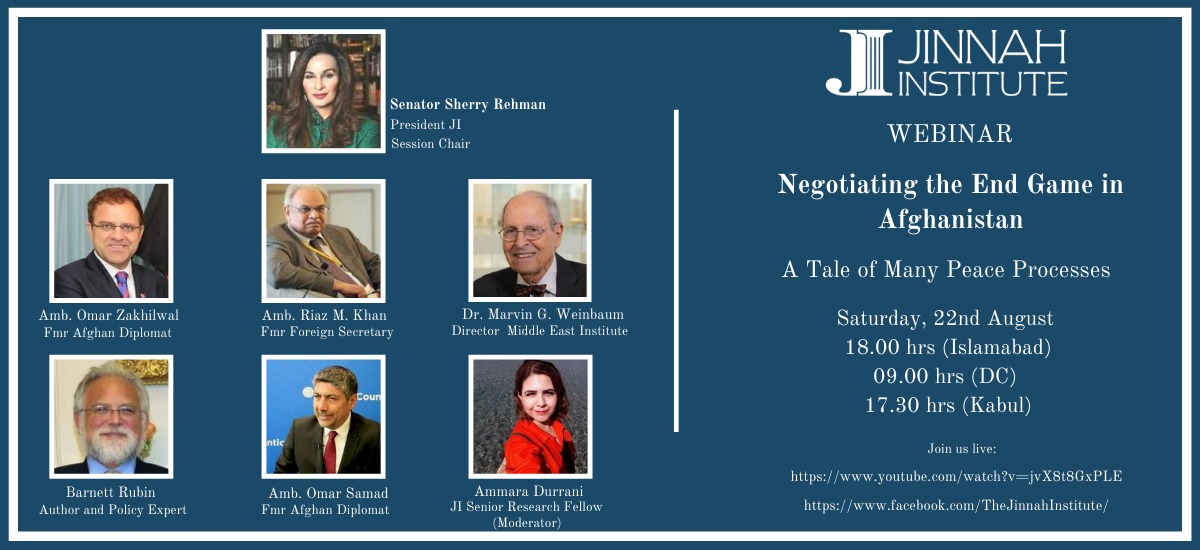Round Table
Negotiating the Endgame in Afghanistan | A Tale of Many Peace Processes
Date: August 22, 2020
“There is no clarity on who will guarantee the Afghan peace or if there is a guarantor at all. Clarity is also needed on what outcomes we are looking at in any timelined future,” stated Senator Sherry Rehman, at Jinnah Institute’s policy roundtable webinar titled, ‘Negotiating the Endgame in Afghanistan: A Tale of Many Peace Processes’ on August 22, 2020. State stability, political power, solvency and the fragility of vulnerable groups would have to be strengthened for the peace process to be successful. It was also important to determine who takes responsibility for what happens in Afghanistan. Success of the talks was important for Kabul and for the US, and equally significant was the need to define ‘success’ for both. Senator Rehman also went on to discuss how Pakistan was assuming responsibility for restricting movement along the border by putting up a fence to be able to adjudicate peacefully.
Former Afghan ambassador Dr Omar Zakhilwal highlighted the need for a uniform definition of peace and that there was still a lack of unity with respect to peace, both in the broader political spectrum but also within the government. “Is peace a complete overhaul of the current state and government, or is it expected that the government will be running as it is and the Taliban, like previously with Hikmatyar, be part of it?” he asked. There were different positions on the national level related to the national agenda, but there were also several political ambitions, surrounding personal power in play. This is why there were instances of contradiction from various individuals. There had been public disagreements for instance, in the last two years, on how Ambassador Khalilzad handled the peace process.
Afghanistan was going through a difficult phase of trying to make sure the pieces fell in place. There were those in Afghanistan that were firm believers in the peace process with all its flaws, shortcomings and challenges, and there were those that saw it as a threat, who would undermine it any way possible, stated senior advisor to Chairman of the High Council for National Reconciliation Afghanistan, Omar Samad. “We are going through a difficult phase of trying to put together coalitions, as well as making sure Afghans are agreeing to the steps that have to be taken towards Intra-Afghan (talks).” He went on to explain that there was more consensus in Afghanistan than there was a year or more ago, but it was not enough.
Professor Emeritus of Political Science at the University of Illinois at Urbana-Champaign Marvin Weinbaum observed that it would be difficult to find a negotiated solution as long as the Afghan Taliban refused to recognise their main adversaries, the Kabul government. He expressed doubt on whether a negotiated solution could be achieved, “The Afghan situation is not a typical power struggle, which would include the bringing together of parties, building common ground, resolving differences and finding a power sharing agreement. This however, is a conflict of values.” He explained that the US had determined that it would leave Afghanistan by the end of this year, regardless of what the outcome to the 2020 Presidential Elections would be.
Former advisor to the US government and UN on Afghanistan Barnett R. Rubin, stated that, “The most important thing for the US is to continue providing economic support to institutions that need it to function. That will create an environment where the groups will be given the time and space to try and work out how they will live together in the changing environment.” With all actors and stakeholders in Afghanistan dependent on external aid through one source or another, and the country grappling with power, it was necessary to establish how each party in the conflict had evolved over the years, and what their motivations were, in order to find middle ground.
Former Pakistan Foreign Secretary Riaz Khan stated that the end to this conflict might not be the same as the one with the Soviet Union in the 80’s as Afghanistan was no longer isolated or insular. “Even if the US withdraws today, it won’t in the manner which the USSR did and will remain engaged. China and Russia will also remain engaged. Afghanistan will not be left isolated.” He expressed Pakistan’s motivations in the peace process, which pertained to ensuring that Afghan soil was not used against Pakistan. Both neighbouring states were fatigued as a result of the ceaseless conflict and wanted a reduction in violence. He also identified positive developments made such as the February 29 peace agreement, but numerous challenges remained, such as the question of an Islamic Republic versus an emirate, or the issue of protecting the rights of women and minorities.
Follow the link to watch the full video:

